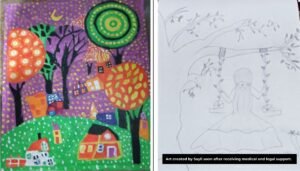
Sonam* is the daughter of a fruit vendor and a housewife. Her father’s income is barely sufficient to provide for her, her three younger sisters and two brothers. One night in February 2013, when Sonam was alone at home, her neighbour entered the house and sexually assaulted her.
Only 11 years old when the incident occured, Sonam was threatened by the abuser and warned not to tell anyone about the incident. One of Sonam’s sisters, seven-years-old at the time, witnessed the incident. While initially, out of fear, Sonam did not inform anyone about the assault, she eventually confided in her elder brother, who told their mother. Immediately, the police were informed and the accused apprehended.
When the case went to trial, the Trial Court raised concerns that there were contradictions and inconsistencies in the testimonies of the prosecution witnesses. The Court also expressed apprehension regarding the case of the prosecution and the possibility of a false implication. Moreover, the Trial Court judge maintained that the prosecution had failed to prove with certainty that Sonam’s age was below 12 years on the date of the incident, which was significant because penetrative sexual assault on a child who is below 12 years of age tantamounts to an aggravated form of sexual assault under the law. After a long legal battle, the Court acquitted the accused in 2016.
This case was referred to iProbono in 2018, to challenge the order of acquittal before the Delhi High Court. iProbono’s panel lawyer Bharat S. Kumar represented Sonam in the appeal filed by the state against wrongful acquittal of the accused. It was argued before the Delhi High Court that the Trial Court judge failed to consider the testimony of the child and other witnesses, as well as the medical evidence that was sufficient to convict the accused. It was further argued that Sonam’s statement was corroborated by the medico-legal case (MLC) that reported her hymen was torn even though the forensic examination did not find the presence of semen in the vaginal swab or on her clothes. The Court also observed that it was not unusual that there was no semen on the vaginal swabs taken during medical examination as Sonam had bathed and defecated since the day of the incident.
Regarding the aspect of age, the High Court observed that all the testimonies and evidence provided confirmed that Sonam was below 12 years at the time of crime. The Court also went on to clarify that the difference in age does not invalidate the offence of rape. The only consequence of the victim being found to be below 12 years, is that the rape, if established to have been committed, would tantamount to aggravated sexual assault (as defined in Section 5(m) of the Protection of Children Against Sexual Offences (POCSO) Act). The High Court was of the view that the core of the prosecution’s case remained intact throughout the trial. Additionally, it was established without question that the testimony of the child was credible and further corroborated by other witnesses, and the medical evidence.
As a result of the appeal, the Delhi High Court in October 2018, reversed the acquittal of the accused and convicted him for the offence of aggravated sexual assault, sentencing him to 10 years of rigorous imprisonment. The High Court remarked, “It is not easy, and it requires courage and confidence for the victim to speak up and disclose the offence. This is more so when the victim and other witnesses are small children and have been threatened with dire consequences. Unfortunately, the Additional Sessions Judge (Ld. ASJ) has shown complete lack of sensitivity and understanding of human behaviour in this regard while appreciating the evidence.” The Delhi High Court also criticised the Trial Court for its cut and dry approach and for being influenced by wholly irrelevant and minor embellishments and inconsistencies, which are bound to creep into in any case.
The case is significant as it discusses some recurrent issues that emerge during a POCSO trial, such as minor inconsistencies in children’s statements, the relevance of the child’s age, and proper analysis of the MLC report. The High Court judgment further points out that the Trial Court judgment suffered from serious infirmities and reflects on how the lack of sensitivity and proper appreciation of evidence by a Court can lead to a grave miscarriage of justice.
*Name changed to protect identity.












